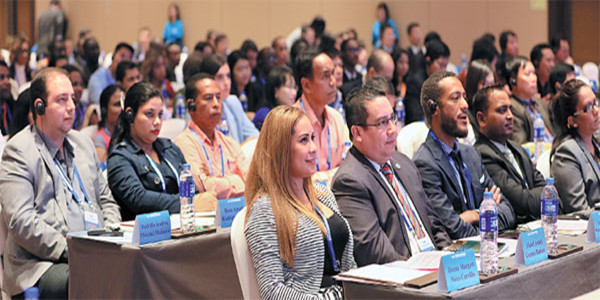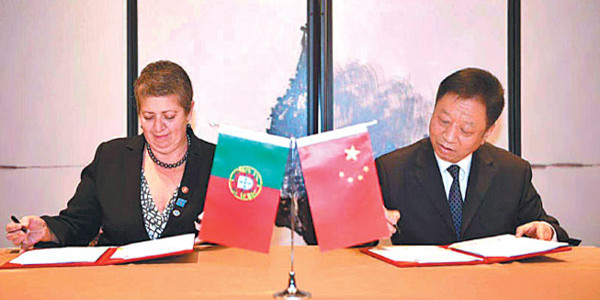World Ocean Week in Xiamen helps to find blue economy partnerships

China aspires to build a sustainable marine ecological civilization, said Wang Hong, administrator of the State Oceanic Administration.
Wang made the remarks at the opening ceremony of the Blue Economy Partnership Forum during the 2017 World Ocean Week in Xiamen, Fujian province, on Nov 3. The event centered on the theme of global ocean governance for a blue economy.
"Blue" refers to reducing environmental risks and prioritizing ecological protection, as the ocean equivalent to "green".

Participants from China and abroad, as well as representatives from international groups, discuss maritime issues during the ongoing World Ocean Week in Xiamen, Fujian province.

Representatives of Portugal and China sign a partnership in Xiamen on Friday.
As part of the World Ocean Week in Xiamen from Nov 3 to 9, the forum aimed to build up blue partnerships, share blue economy practices and promote marine cooperation among China and other countries.
"We have focused more on coordinated development that balances the marine industry and ecological protection in recent years," Wang said.
"China is willing to build future-oriented, open, inclusive and concrete blue partnerships of mutual benefit with other countries and international organizations," he said.
The country wants to "establish a stable dialogue mechanism to develop mutual trust, expand cooperation areas, strengthen resource sharing and push the development of the blue economy", Wang added.
The establishment of a blue partnership between China and Portugal was the highlight of this year's event.
The State Oceanic Administration of China signed the Concept Paper on Blue Partnership and Joint Action Plan Framework with the Ministry of the Sea of Portugal on Friday, making Portugal the first country to officially launch a blue partnership with China.
"A sustainable ocean economy is important in promoting economic growth, to create jobs and investment and to generate wealth, but also to address some of the greatest societal challenges our planet faces today," said Ana Paula Vitorino, Portuguese minister of the sea.
"We must make the best use of the potential of the blue economy, while safeguarding the health of the oceans," Vitorino said in her speech at the forum.
"The agreement entitled 'Blue Partnership' aims at promoting marine cooperation in a wide range of areas, from improving our understanding of the ocean, honoring the international commitment made by both countries, and providing a leading model for global marine governance," she said.
Concrete activities are being planned and agreed, including research personnel exchanges, biodiversity restoration, port cooperation, and technology exchanges related to wave energy equipment and other fields.
The blue economy, the core of which is sustainable marine economic development, has become a key engine for innovation-oriented growth in the world's major maritime countries.
The United Nations has stressed on many occasions the important role of blue growth in achieving the UN 2030 Agenda for Sustainable Development.
In 2014, the fourth APEC Ocean Ministerial Meeting adopted the Xiamen Declaration, reaching a consensus on deepening the Asia-Pacific blue economy cooperation.
At the ninth BRICS summit held in Xiamen in September 2017, the blue economy issue was included in the business forum's agenda.
In September, China adopted the Pingtan Declaration and explored the establishment of marine partnerships featuring the blue economy.
More than 200 representatives from over 40 countries attended the forum, 23 of whom gave a keynote speech in all matters related to ocean governing for a blue economy.
Fong Weng-Poorun, senior chief executive of the Ministry of Ocean Economy, Marine Resources, Fisheries and Shipping of Mauritius, said it is the first time that her country had participated in the event.
"The blue economy has become an important pillar for development in many countries. The ocean week in Xiamen brings together many countries at different levels of implementing their blue economy, and we are going to share experiences," she said.
During the one-day forum, officials and scholars discussed issues relating to ocean governance, spanning strategy and policy for a blue economy, and cooperation in fields including technological innovation, disaster prevention and marine debris management.
MOST POPULAR
Editors' Picks
 Infographic:
China's NEV industry performance review
Infographic:
China's NEV industry performance review
 Infographic:
China's low-altitude economy: A transformative force
Infographic:
China's low-altitude economy: A transformative force
 Infographic:
China's development in culture, tourism industries
Infographic:
China's development in culture, tourism industries




